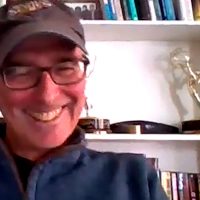Author / Journalist Bob Reiss: Living on the Border of Order & Anarchy

BOB REISS is a bestselling author of 23 books, as well as a journalist, a former Chicago Tribune reporter and former correspondent for Outside Magazine. His work has been published in The Washington Post Magazine, Smithsonian, Parade, Rolling Stone and other national publications, and has been featured in collections of the best of the Washington Post Magazine, and the best of Outside. He has appeared on Good Morning America, Morning Joe, CNN, Charlie Rose, Al Jazeera and Dan Rather Reports. In 2019 he was a recipient of a Redford Center grant as co-producer of a documentary film project on the importance of the Bering Strait as the Arctic opens. In 2018 he received a New York Press Club best magazine reporting Award for his coverage of the Arctic National Wildlife Refuge in Alaska, in Fortune magazine. In 2015 he was a consultant on an NBC Nightly News series on the Arctic. In 2012-2013 he worked as a consultant on Arctic issues for CBS “60 Minutes.” In 2010 he co-produced his first investigative segment for national television, for PBS’s “Need to Know.”
Writing as James Abel, Bob’s launched a new series of science-based bio-thriller novels in 2015, with the publication of “White Plague,” about a US submarine trapped in the Arctic. “Protocol Zero” followed in August, 2015. “Cold Silence” was published in summer 2016, and “Vector” in summer 2017. The novels draw on the author’s journalistic experiences in the Arctic, East Africa and the Amazon, and link emerging biological threats in these places to terrorism and international security. To distinguish the fiction from the Arctic journalism, the novels are being published under the James Abel pseudonym.
Reiss has published 19 novels in all, including the Washington Post best-seller, “The Last Spy” and the European best seller, “Black Monday.” He was the author of the acclaimed Conrad Voort series, five novels about a New York City detective whose ancestors have worked law enforcement in the city since colonial times.
Reiss’s non-fiction books include “The Eskimo and The Oil Man,” about the opening Arctic and battle over offshore oil there; “The Coming Storm”, about climate change and extreme weather, and “The Road to Extrema”, about the state and fate of the Amazon rainforest.
Reiss grew up in New York City and graduated from Northwestern University with a Bachelor’s degree in Journalism, and from the University of Oregon with an MFA. He says he knew he wanted to be a writer since age 13, when he finished his first novel.
Reiss has traveled around the world since then and his experiences in places including Antarctica, Sudan, Somalia, South Africa, Alaska, the Amazon rainforest and numerous other remote locations inform both his fiction and non-fiction. He lives in New York City with television producer Wendy Roth.
Reiss’s new collection of short stories, titled “Still Hungry,” will be published in October 2022.
The videos below were recorded via Zoom, are organized by Success Factor, and run between 30 seconds and 9 minutes. Click on any video. You must be connected to the Internet to view the videos.
EXPOSURE TO BROAD INFLUENCES: 0:36 sec.
INSIGHT & INSPIRATION: 1:01 min.
RESILIENCE: 0:32 sec.
DEVELOP A VOICE: 1:24 min.
PERSEVERANCE FURTHERS: 1:17 min.
CRITICAL THINKING: 5:11 min.
Here is a link to the story that Bob Reiss wrote for Parade magazine — “Collateral Damage: How The Iraq War Effects Your Town.” The story was supposed to be the cover story for Parade, which was read by 30 million people at the time. As the story was coming off the printing presses, the publisher killed the story for political reasons.
CRITICAL THINKING: 2:38 min.
OVERCOMES CHALLENGES TO SUCCEED: 5:37 min.
CREATES A UNIQUE PERSONAL BRAND: 1:21 min.
INSIGHT & INSPIRATION: 1:55 min
UNDERSTANDS THE BUSINESS OF ART: 1:41 min
UNDERSTANDS THE BUSINESS OF ART: 2:03 min.
UNDERSTANDS ARTISTS’ NEEDS: 4:04 min.
CREATES A UNIQUE PERSONAL BRAND: 2:38 min
CRITICAL THINKING: 1:31 min.
CRITICAL THINKING: 1:26 min.
PERSEVERANCE FURTHERS: 4:50 min
INSIGHT & INSPIRATION: 5:39 min.
EMPATHY: 2:18 min.
OVERCOMES CHALLENGES TO SUCCEED: 4:10 min.
CREATES A UNIQUE PERSONAL BRAND: 8:34 min
CREATES A UNIQUE PERSONAL BRAND: 1:56 min
CRITICAL THINKING: 0:30 sec.

